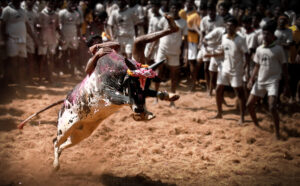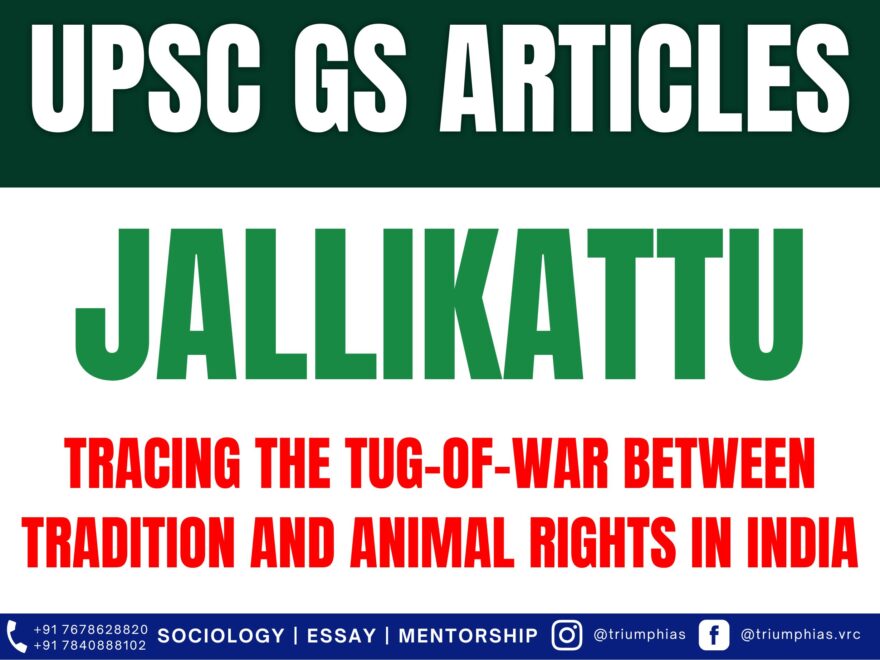Jallikattu
Tracing the Tug-of-War Between Tradition and Animal Rights in India

Introduction
Tamil Nadu, a southern Indian state, is rich in cultural traditions, one of which, the sport of Jallikattu, stands out with its unique blend of adrenaline, skill, and tradition. This bull-taming sport, tracing its origins over 2,000 years, encapsulates the heritage and pride of the Tamil Nadu people. However, it has recently ignited an intense debate between tradition and animal rights, further fueled by legislative amendments to the Prevention of Cruelty to Animals (PCA) Act of 1960, upheld by a five-judge constitutional bench of the Supreme Court.
Decoding Jallikattu
Jallikattu, also known as eruthazhuvuthal, is a sport wherein participants attempt to tame a bull to claim a prize. Should they fail, the reward goes to the bull’s owner. The sport holds a historical and cultural significance dating back centuries, its earliest references found in the ancient Tamil epic Silappadikaram and a seal from the Indus Valley civilization.
Tradition Upheld: A Legal Perspective
Recent amendments made by the legislatures of Tamil Nadu, Maharashtra, and Karnataka have permitted bull-taming sports such as Jallikattu, Kambala, and bullock-cart races, setting a significant legal precedent. Here are some key points from the verdict:
- The amendments align with Entry 17 (prevention of cruelty to animals) of the Concurrent List and Article 51A(g) (compassion for living creatures) of the Constitution.
- The court affirmed that the amendments “substantially reduced pain and cruelty” towards the participating animals.
- Any violation of the statutory law in the name of “cultural tradition” would attract penal consequences.
- The amendments do not violate Articles 14 and 21 of the Constitution, despite arguments from petitioners about animals’ right to live with dignity.
The Rollercoaster Timeline of Jallikattu
The controversy surrounding Jallikattu has seen several legal twists and turns. Key events include:
- In 2006, the Madras High Court banned Jallikattu, leading to the introduction of The Tamil Nadu Regulation of Jallikattu Act of 2009.
- In 2011, the central government included bulls in the list of animals whose training and exhibition was prohibited.
- The Supreme Court in 2014 upheld that Jallikattu amounted to cruelty to bulls and banned similar sports countrywide.
- In 2016, the Union Environment ministry revoked its 2011 notification, which the top court had used to order the ban.
- The Tamil Nadu state government passed the Prevention of Cruelty to Animals (Tamil Nadu Amendment) Act of 2017 and Prevention of Cruelty to Animals (Conduct of Jallikattu) Rules of 2017, once again allowing the sport.
Arguments For and Against Jallikattu
Proponents of Jallikattu argue for its cultural significance and propose that the practice can be regulated instead of being outright banned. Meanwhile, critics claim that the event infringes on animal rights and has resulted in numerous injuries and fatalities to humans and bulls.
The recent Supreme Court verdict, allowing bull-taming sports like Jallikattu, has injected a new dynamism into this debate. The court’s decision recognizes the cultural significance of Jallikattu while underscoring the imperative of preventing cruelty to animals and upholding statutory law.
Conclusion
The Jallikattu controversy encapsulates the complex intersection between cultural tradition and animal rights. Striking a balance between preserving cultural practices and ensuring animal welfare emerges as the primary challenge, a tightrope that both society and the judiciary need to walk with caution.
Follow us :
🔎 https://www.instagram.com/triumphias
🔎https://www.youtube.com/c/TriumphIAS
https://t.me/VikashRanjanSociology
Jallikattu, Animal Rights, Cultural Traditions, Prevention of Cruelty to Animals Act, Indian Law, Tamil Nadu, Supreme Court of India, Tradition Vs Animal Welfare
#Sociologyforupsc #sociologyforupscinhindi #sociologyforupscgs1 #sociologyforupscprelims #sociologyforupscinenglish #sociologyforupscmainsinhindi #sociologyforupscoptionalinhindi #sociologyforupscmains #sociologyforupscplaylist #sociologyforupsclecture1 #sociologyforupsccse #sociologyforupscoptional

